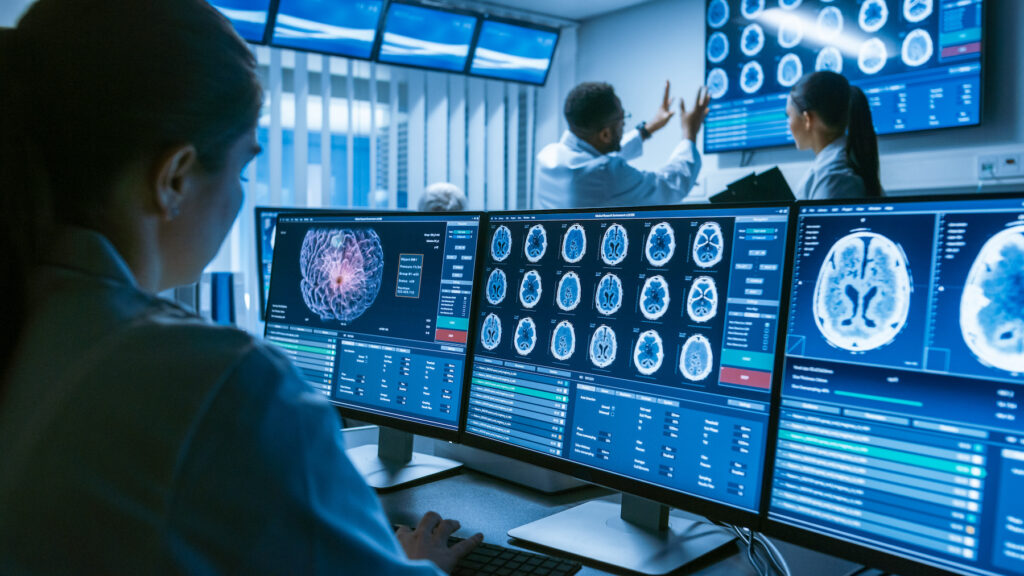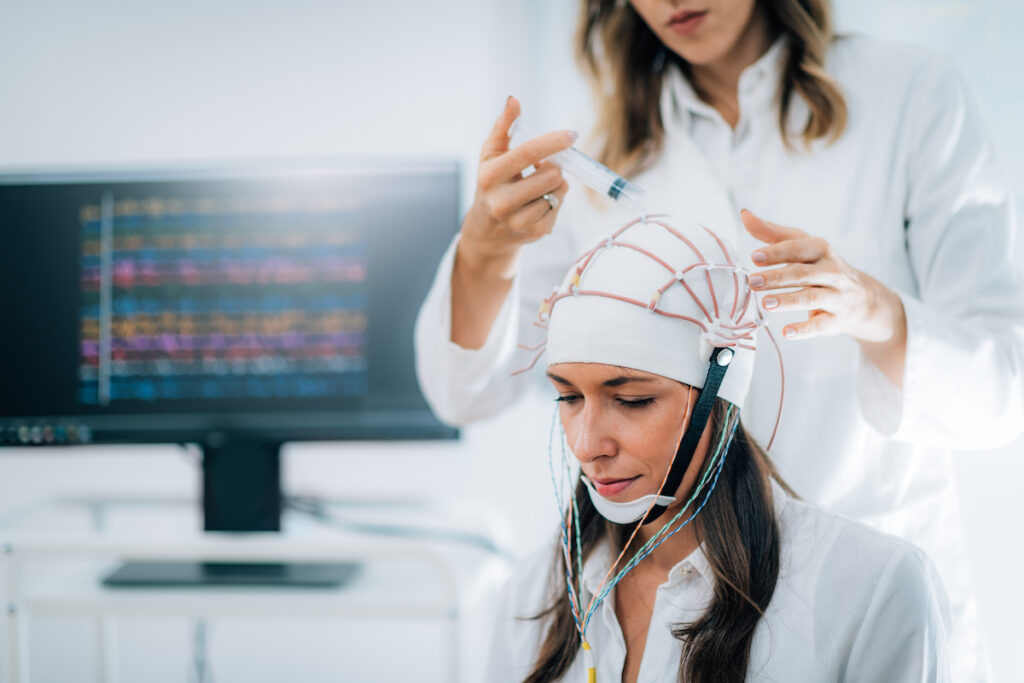
MeRT: A Breakthrough Treatment for Post-Traumatic Stress Disorder (PTSD)
This drug-free, non-invasive, and lasting treatment can help ease your symptoms and let you start living again.
MeRT for PTSD Is Backed by Years of Rigorous Scientific Research
MeRT offers a highly personalized approach to addressing PTSD, drawing from the well-established foundation of repetitive Transcranial Magnetic Stimulation (rTMS). This advanced therapy is supported by a substantial body of independent, peer-reviewed studies featured in top-tier medical journals. Below are several key research highlights.
A retrospective chart review to assess the impact of alpha-guided transcranial magnetic stimulation on symptoms of PTSD and depression in active-duty special operations service members, 21 June 2024.
“This data provides a demonstration of significant reduction in PTSD and depression symptoms and safety with the application of a-rTMS in active-duty special operations military personnel. Expansion of targeted neuromodulation programs could be impactful for military and civilian populations.”
How Electric Therapy Is Curing Navy SEALs of PTSD, Jan 2019.
“Hundreds of vets have tried out an experimental new treatment that could change how the world addresses mental disorders.” And, “All said that they saw big improvements after a course of therapy that ran five days a week for about four weeks.”
Synchronized transcranial magnetic stimulation for posttraumatic stress disorder and comorbid major depression.
“All participants demonstrated significant reductions in PTSD and MDD symptoms (all p < .001). As expected, there were significant reductions in symptoms in both treatment groups, but active stimulation did provide greater reductions in count of PTSD moderate-to-severe symptoms.”
Magnetic Resonance Therapy Improve Clinical Phenotype and EEG Alpha Power in Post-traumatic Stress Disorder, in Trauma Monthly, November 2015.
“This study suggests that non-invasive neuromodulation magnetic resonance therapy may lead clinical improvements as well as a trend toward normalization of EEG pathophysiology in PTSD.”
Magnetic E-Resonant Therapy Alleviates Combat Related Post-traumatic Stress Disorder, in Aerospace Medical Association, March 2017.
“Our preliminary results suggest that transcranial MeRT may provide an alternate method to help veterans suffering from PTSD.”

Individualized Electromagnetic Treatment in Posttraumatic Stress Disorder: a Randomized, Double-blind, Sham-controlled Trial, Poster Accepted, Taghva, et al.
“This double-blind, randomized, controlled trial shows that transcranial magnetic therapy based on individualized frequencies derived from EEG/EKG is an effective therapy for PTSD in improving overall symptoms and quality of sleep.”
EEG_EKG Guided TMS in veterans with PTSD_Randomized double-blinded pilot study.
“Following 2 weeks of EEG-EKG guided transmagnetic stimulation, significant changes in symptom severity and EEG measures are reported for 80 retired military veterans with post-traumatic stress disorder. Patients had greatest comparative reductions in PCL-M subscales VII “avoid situation indicator” XII “short future indicator” and XIII “trouble falling or staying asleep indicator”. The improvement in sleep was confirmed for treated vs sham group in PSQI-A, and, may suggest correlation between sleep disorder and PTSD symptoms. Of the 37 patients who had suicidal ideation by HAM-D, 29 patients denied ideation by 4 weeks. No patient worsened in clinical PTSD symptoms after receiving therapy. “
Low-frequency, Repetitive Transcranial Magnetic Stimulation for the Treatment of Patients with Posttraumatic Stress Disorder: a Double-blind, Sham-controlled Study, Nam et al, 2013.
“The present study showed low-frequency rTMS to be an effective and tolerable option for the treatment of PTSD. Trials using variable indices of rTMS to the right prefrontal cortex and explorations of the differences in the effects on specific symptom clusters may be promising avenues of research regarding the use of rTMS for PTSD.”
Hear it from the Patients
MeRT patients have a lot to say about their experience with Treatment!
“THANK YOU SO VERY MUCH for your help with TMS/MeRT for my PTSD symptoms! Refiring those frontal lobe neurons had me reading ten novels in six months! I’ve NEVER read that many in ALL my prior life!
“The confusion, distraction, and memory issues were greatly reduced. The treatment does wonders. And whatever you did last time had an unexpected, incredibly wonderful effect. Besides helping with my sciatic, shoulder, and leg pains, I STOPPED TAKING OXYCODONE A WEEK AFTER, COLD TURKEY, unexpectedly AND WITH ZERO WITHDRAWAL SYMPTOMS!
“IT WAS LIKE I’D NEVER TAKEN THEM, but the truth is that I did for at least a decade prior. It was Vicodin for the decade prior to that. Now, while I do have some pains, I take NO OPIODS! I manage with ibuprofen, and Tylenol. This is worth every penny. THANK YOU!”
PTSD Patient
Patient“Combat has robbed me of the ability to show my husband spontaneous affection. My husband’s PTSD is so severe that if I reach for him, he flinches. He swings at me and pushes and has actually smacked me.
“I have not been able to go up behind him and put my arms around him for seven years. But I was finally able to for the first time yesterday after only two days of treatment.
“I actually walked up behind him, and he didn’t jump or flinch as I hugged him. He instead turned around and hugged me tight, kissed me, and said, ‘I love you, love.’ He’s usually never affectionate, loving, or happy towards me. That’s a miracle.”
Wife. of Marine Veteran
“Of all my injuries, by far the worst were the ones you could not see. I had degraded to the point of not being able to leave my home because of panic attacks and severe anxiety. I could not hide from this feeling, and no medication could numb it.
“At one point, I told my doctor I couldn’t kill myself because I have a family with young children that I am responsible for. I was living in despair and physical pain every day without reprieve — that is, until I was able to get treatment.
“I underwent neural restorative therapy [MeRT] for two months with total symptom resolution. Now I can function again at work and can spend much-needed time with my family. I have my sense of well-being back and a clarity of thought I haven’t had in many years.”
US Army Veteran
“We have seen a dramatic change in Alex. He is so calm, happy, and positive. He wakes more alert. The man I knew was inside of him has finally come out. We are so much closer as a couple, and the relationship between our kids and him is much more functional.
“The VA has treated him for the past six years, and he’s undergone so much individual and group therapy, but it has NEVER had this positive effect on him. I will forever be grateful.”
Wife of Army Veteran
“With being diagnosed with PTSD, depression, and anxiety by Veterans Affairs, a calm and welcoming environment is important. The treatment makes me sleep longer and deeper than before treatment. My ‘dark feelings’ fade away. I feel happy and calm.”
Sean K.
“It was absolutely terrifying not to know what was wrong with me or how to fix the problem. MeRT not only identified the deteriorated state of my brainwave activity, it restored its function. I consider the healing I experienced to be nothing short of a miracle.”
US Army Veteran
“Within four days of being treated, I was sleeping through the night. My anger had subsided significantly, and I was smiling and enjoying things again. I was able to focus and concentrate on information much more efficiently and easily and did not get lost in conversation as I had prior to coming to BTC. My chronic headaches had ceased, my balance was returning, and my ringing in my ears (tinnitus) had also ceased.”
Marine EOD Tech
Patient“The experience I had at BTC was nothing short of a miracle. The treatment I received has completely changed my life for the better.
“I was able to reset my circadian rhythm and sleep through the night without medication. My nightmares became few and far between. My anxiety lessened almost immediately, and I became able to do the things I used to enjoy, like going to the gym, cooking, and reading.
“I could focus my attention again, and my mood lightened a lot. My fiancé and family immediately noticed the change in me and said that it was like they had gotten their ‘old’ Sarah back.”







